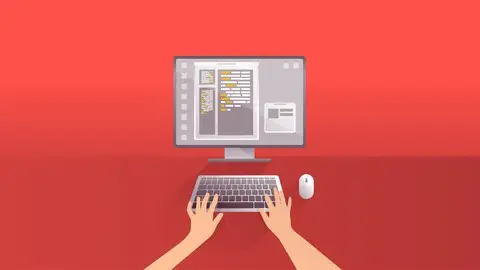Concurrency, Multithreading And Parallel Computing In Java
Last updated 1/2023
MP4 | Video: h264, 1280x720 | Audio: AAC, 44.1 KHz
Language: English | Size: 3.65 GB | Duration: 10h 22m
Last updated 1/2023
MP4 | Video: h264, 1280x720 | Audio: AAC, 44.1 KHz
Language: English | Size: 3.65 GB | Duration: 10h 22m
Multithreading and Concurrent Programming, Parallel Computation and MapReduce in Java + Fork-Join and Stream API
What you'll learn
Understand basic concurrency
Understand the basics of multithreading
Understand parallel processing
Able to use the concepts in real life scenarios
Understand concurrent collections
Understand synchronization and locking
Understand the Fork-Join Framework
Understand Stream API
Requirements
Basic Java (inheritance, object oriented programming)
Description
This course is about the basics of multithreading and concurrent programming with some parallel concepts. In the 21st century this topic is becoming more and more popular with the advent of Big Data and Machine Learning. We will consider the low level concepts such as threads, synchronization and locks. The second chapter will be about concurrent library: of course there are built in classes and interfaces that we can use when implementing multithreaded applications. Then we develop little programs as show-cases for multithreading: the dining-philosopher problem and the students in library simulation. Last chapter is about parallel computing and MapReduce. Section 1 - Multithreading Theory:theory behind multithreadingpros and cons of multithreadinglife cycle of a theadSection 2 - Threads Manipulation:starting threads (Runnable interface and Thread class)join keyworddaemon threadsSection 3 - Inter-Thread Communication:memory management of threadssynchronization and synchronized blockslockswait and notifyproducer-consumer problem and solutionconcurrent collectionslatch, cyclic barrier and blocking queuesdelay queue, priority queue and concurrent mapsSection 4 - Multithreading Concepts:volatile keywordsdeadlocks and livelockssemaphores and mutexesdining philosophers problemlibrary applicationSection 6 - Executors and ExecutorServices:executorsexecutor servicesSection 6 - Concurrent Collections:synchronization with Collectionslatchescyclic barriersdelay and priority queuesconcurrent HashMapsCopyOnWriteArrayListsSection 7 - Simulations:dining philosophers problemlibrary problemSection 8 - Parallel Algorithms:what is parallel computingparallel merge sortparallel algorithmsSection 9 - Fork-Join FrameworkFork-Join frameworkmaximum finding in parallel mannerSection 10 - Stream APIthe Stream API explained with examplessequential streams and parallel streamsSection 11 - BigData and MapReduce:what is MapReduceMapReduce and Fork-Join frameworkThanks for joining my course, let's get started!
Overview
Section 1: Introduction
Lecture 1 Introduction
Section 2: ### MULTITHREADING ###
Lecture 2 Multithreading section
Section 3: Multithreading Theory
Lecture 3 Processes and threads introduction
Lecture 4 What is time-slicing algorithm?
Lecture 5 Benefits of multithreading
Lecture 6 Downside of multithreading
Lecture 7 Thread lifecycles
Section 4: Threads Manipulation
Lecture 8 Sequential processing
Lecture 9 Starting threads - Runnable
Lecture 10 Starting threads - Thread class
Lecture 11 Runnable interface and Thread class
Lecture 12 Wait for threads to finish - join
Lecture 13 Daemon threads and user threads
Lecture 14 Thread priority and Java Thread Scheduler
Section 5: Inter-Thread Communication
Lecture 15 Memory management of threads
Lecture 16 Synchronization
Lecture 17 Problems with synchronization
Lecture 18 Locking with custom objects
Lecture 19 What are re-entrant locks?
Lecture 20 Wait and notify
Lecture 21 What is the difference between wait and sleep?
Lecture 22 Producer and consumer
Lecture 23 Locks
Lecture 24 Producer consumer with locks
Lecture 25 Locks and synchronization
Section 6: Multithreading Concepts
Lecture 26 Volatile
Lecture 27 Stopping a thread
Lecture 28 Deadlock and livelock
Lecture 29 Deadlock example
Lecture 30 Livelock example
Lecture 31 Atomic variables
Lecture 32 What are semaphores?
Lecture 33 Mutexes and semaphores
Lecture 34 Semaphores example
Lecture 35 Mutex and binary semaphore
Section 7: Creating Threads with Executors
Lecture 36 Why to use thread pools?
Lecture 37 Executors example - SingleThreadExecutor
Lecture 38 Executors example - FixedThreadPools
Lecture 39 Executors example - ScheduledExecutor
Lecture 40 Stopping executors
Lecture 41 What is a Callable interface and Future object?
Lecture 42 Callable and future example
Section 8: Concurrent Collections
Lecture 43 What is the collections framework?
Lecture 44 Collections synchronization
Lecture 45 Latch
Lecture 46 Cyclic barrier
Lecture 47 Blocking queue
Lecture 48 Delay queue
Lecture 49 Priority queue
Lecture 50 Concurrent maps
Lecture 51 Exchanger
Lecture 52 CopyOnWriteArrays
Section 9: Multithreading Exercise I - Dining Philosophers Problem
Lecture 53 Dining philosophers problem I - the problem
Lecture 54 Dining philosophers problems II - constants
Lecture 55 Dining philosophers problems III - chopstick
Lecture 56 Dining philosophers problems IV - philosopher
Lecture 57 Dining philosophers problems V - starting the threads
Lecture 58 Dining philosophers problems VI - running the simulation
Section 10: Multithreading Exercise II -Students Library Problem
Lecture 59 Student library simulation I - the problem
Lecture 60 Student library simulation II - constants
Lecture 61 Student library simulation III - book
Lecture 62 Student library simulation IV - student
Lecture 63 Student library simulation V - lock() and tryLock()
Lecture 64 Student library simulation VI - running the simulation
Section 11: ### PARALLEL ALGORITHMS ###
Lecture 65 What is parallel computing?
Section 12: Parallelization
Lecture 66 Sequential merge sort introduction
Lecture 67 Sequential merge sort implementation
Lecture 68 Merge sort and stack memory visualization
Lecture 69 Parallel merge sort implementation
Lecture 70 Running time comparison of merge sort implementations
Lecture 71 Sum problem introduction
Lecture 72 Sum problem - sequential approach
Lecture 73 Sum problem - parallel implementation
Lecture 74 Running time comparison of sum operations
Section 13: Fork-Join Framework
Lecture 75 What is the Fork-join framework?
Lecture 76 Fork-join framework simple example - RecursiveAction
Lecture 77 Exercise - printing integers
Lecture 78 Solution - printing integers
Lecture 79 Fork-join framework simple example - RecursiveTask
Lecture 80 Exercise - Fibonacci-numbers
Lecture 81 Solution - Fibonacci-numbers
Lecture 82 Thread optimization
Lecture 83 Maximum finding - the algorithm
Lecture 84 Maximum finding - running the application
Lecture 85 Merge sort revisited I
Lecture 86 Merge sort revisited II
Section 14: Using Java's Stream API
Lecture 87 What is the Stream API?
Lecture 88 Streams with numbers
Lecture 89 Streams with strings
Lecture 90 Collections and streams
Lecture 91 Streams with custom objects - part 1
Lecture 92 Streams with custom objects - part 2
Lecture 93 Exercise - filtering
Lecture 94 Solution - filtering
Lecture 95 External and internal iteration
Lecture 96 Processing files with streams
Lecture 97 Short-circuiting and loop fusion
Lecture 98 map() and flatMap()
Lecture 99 Exercise - mapping
Lecture 100 Solution - mapping
Lecture 101 Optionals and other important concepts
Lecture 102 OptionalInt, OptionalFloat and OptionalDouble
Lecture 103 allMatch(), noneMatch(), findFirst() and findAny()
Lecture 104 Parallelization - example #1
Lecture 105 Parallelization - example #2
Lecture 106 Parallelization - example #3
Section 15: MapReduce and Parallelization
Lecture 107 MapReduce introduction - basics
Lecture 108 MapReduce introduction - example
Lecture 109 MapReduce and Fork-Join
Section 16: Course Materials (DOWNLOADS)
Lecture 110 Course materials
This course is meant for students who want to get a good grasp on multithreading in java or just want a quick refresher



